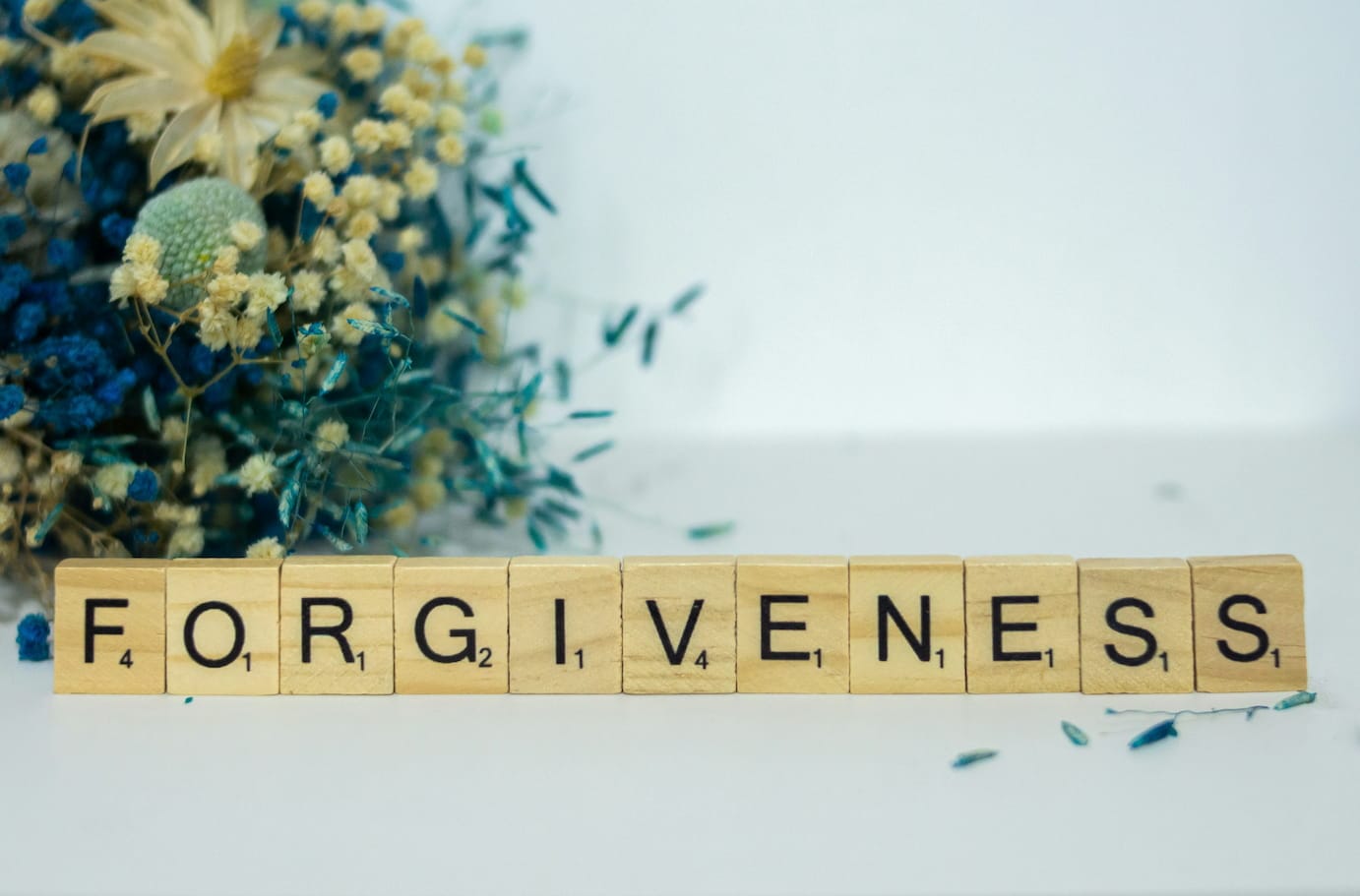Learning to forgive yourself might be the most important, challenging, and rewarding journey you’ll ever take. (I talk from my healing and self-forgiveness journey!)
Forgiving yourself means facing your past choices, the ones you regret, the words you did or didn’t say, the feelings you ignored, and the times you betrayed yourself or hurt others.
Self-forgiveness isn’t about letting yourself off the hook without reflection.
It’s about acknowledging your humanity, understanding that you did your best with the awareness, tools, and self-love you had at the time, and choosing to release the burden of shame.
Why Is Self-Forgiveness Hard?
Self-forgiveness challenges us at our core because it requires facing uncomfortable truths.
When you look back at choices that betrayed your values, hurt others, or caused pain, often to yourself, you might feel overwhelmed by guilt, shame, and regret.
Many people find it easier to forgive others than themselves.
This happens because:
- You hold yourself to impossible standards that you wouldn’t expect from anyone else
- Shame convinces you that your mistakes define your worth as a person
- Cultural messaging often equates accountability with perpetual punishment
- You believe suffering somehow balances the scales of your past actions
But avoiding these emotions keeps you trapped in cycles of self-judgment.
True forgiveness means stepping into these feelings with compassion and curiosity.
The Science Behind Self-Forgiveness
Research published in the Journal of Positive Psychology shows that self-forgiveness significantly improves mental health outcomes.
People who practice self-forgiveness experience:
- Reduced symptoms of anxiety and depression
- Improved sleep quality
- Better relationship satisfaction
- Greater emotional resilience
When you withhold forgiveness from yourself, your body remains in a stress response.
Your nervous system stays activated, cortisol levels remain elevated, and your mental bandwidth becomes consumed by rumination rather than growth.
Being in a constant state of stress has a huge impact on our holistic health and well-being.
The 4-Step Path to Forgiving Yourself
1. Acknowledge and Accept What Happened
Begin by facing the reality of what happened without denial or minimization.
This step requires complete honesty with yourself.
Practical exercise: Journal about your experience, answering these questions:
- What exactly did I do or say that I need to forgive myself for?
- How did this impact me and others involved?
- What were the circumstances surrounding this situation?
Real-world example: “I stayed in a toxic relationship for years because I was afraid of being alone. I ignored my intuition, compromised my values, and ultimately hurt both myself and my partner by not being honest about my feelings. This led to a painful ending that could have been avoided with earlier honesty.”
2. Understand Your Past Self With Compassion
Your past self made decisions based on the emotional tools, awareness, and capacity you had at that moment.
Understanding the context of your choices doesn’t excuse harmful behavior, it helps explain it.
Practical exercise: Write a letter to your past self expressing understanding for the limitations and fears that influenced your choices.
Real-world example: “At that time, I didn’t have the emotional vocabulary to express my needs. I equated self-sacrifice with love because that’s what I had observed in my family. I was operating from deep-seated fears of abandonment and didn’t have the tools to recognize or address them.”
3. Reframe the Narrative
Instead of labeling yourself as “bad” or “broken,” reframe your understanding of what happened.
Your mistakes aren’t character flaws—they’re growth opportunities.
Practical exercise: Create an empowering interpretation of your experience that focuses on learning and growth.
Real-world example: “That relationship taught me to recognize red flags early, communicate my boundaries clearly, and value authentic connection over comfortable companionship. The pain I experienced was the catalyst for my significant personal growth.”
4. Practice Consistent Self-Compassion
Self-compassion is the foundation of lasting self-forgiveness.
When shame or self-judgment arise, meet these feelings with kindness rather than criticism.
Practical exercise: Place your hand on your heart when difficult emotions surface and say one of these affirmations:
- “This is a moment of suffering. May I be kind to myself.”
- “I did the best I could with the awareness I had at the time.”
- “I am learning and growing every day.”
- “My worth isn’t determined by my mistakes.”
Get my free Self-Compassion guide.
Common Obstacles to Self-Forgiveness (And How to Overcome Them)
The Guilt-Worthiness Trap
The obstacle: You believe you don’t deserve forgiveness, so you punish yourself indefinitely.
The solution: Recognize that carrying perpetual guilt doesn’t help anyone, not you, not those you’ve hurt.
True accountability means learning from mistakes and becoming better, not suffering endlessly.
The Fear of Repeating Mistakes
The obstacle: You worry that forgiving yourself means you’ll repeat the same harmful patterns.
The solution: Self-forgiveness creates the emotional safety needed to examine your actions honestly. When you’re not defending against shame, you can see what led to your choices and create conscious strategies for different future outcomes.
The Perfectionism Problem
The obstacle: You believe that making mistakes means you’re fundamentally flawed.
The solution: Embrace the understanding that imperfection is the human condition.
Everyone makes mistakes; what matters is how you respond to them.
Tools for Self-Forgiveness Practice
Daily Reflection Ritual
Spend five minutes each evening reflecting on moments when you were hard on yourself.
For each instance, write down:
- What happened
- How did you judge yourself
- What a more compassionate approach would look like
Visualization Exercise
Close your eyes and imagine your younger self, the one who made the choice you’re struggling to forgive.
See them clearly, understanding their fears and limitations.
Extend compassion to this version of yourself, perhaps even mentally embracing them.
Release Ceremony
Create a symbolic ritual to release self-judgment:
- Write down what you’re forgiving yourself for on paper
- Read it aloud, followed by “I forgive myself for this”
- Safely burn the paper (or tear it up) to symbolize release
Self-Forgiveness Meditation
Try this 10-minute meditation:
- Find a comfortable position and close your eyes
- Place one hand on your heart
- Breathe deeply, focusing on the sensation of your breath
- Silently repeat: “I acknowledge my humanness. I forgive myself for not knowing what I know now.”
- Visualize releasing emotions of guilt, shame, regret, sadness, hurt, disappointment… with each exhale
When Self-Forgiveness Feels Impossible
If you’re struggling significantly with self-forgiveness, especially around traumatic experiences or actions that caused serious harm, professional support can be invaluable.
Consider:
- Therapy approaches like compassion-focused therapy or internal family systems
- Support groups where you can share with others on similar journeys
- Working with a coach trained in emotional processing and self-compassion
Self-Forgiveness as a Lifelong Practice
Self-forgiveness isn’t a destination—it’s an ongoing practice.
Some days will be easier than others.
The journey isn’t linear, but each time you choose compassion over criticism, you strengthen your capacity for self-forgiveness.
Remember that forgiving yourself doesn’t mean forgetting or dismissing the impact of your actions.
It means holding both accountability and compassion simultaneously, understanding that you can learn from your mistakes without being defined by them.
The Ripple Effect of Self-Forgiveness
When you forgive yourself, you:
- Create space for authentic growth and learning
- Become more capable of genuine empathy toward others
- Reduce the defensive behaviors that often lead to repeated mistakes
- Develop greater capacity for meaningful connection
- Model healthy emotional processing for others in your life
Self-forgiveness is the foundation of genuine transformation.
Ready To Forgive Yourself?
No matter what you’ve done or what’s been done to you, you deserve the peace that comes with self-forgiveness.
Your future isn’t defined by your mistakes.
You have a choice to change today, so your future is not a “punishment” or a “price to pay” for the things you have done in the past.
Start where you are.
Choose one small moment to forgive yourself.
Notice how it feels in your body to release even a fraction of the weight you’ve been carrying.
This journey of self-forgiveness may be challenging, but it leads to the most profound freedom you’ll ever know, the freedom to be authentically, imperfectly human.
If you’re seeking support on your self-forgiveness and freedom journey, I work with clients to navigate these challenges. Together, we can create a path toward self-compassion and self-actualization.
Reach out when you’re ready to begin.

